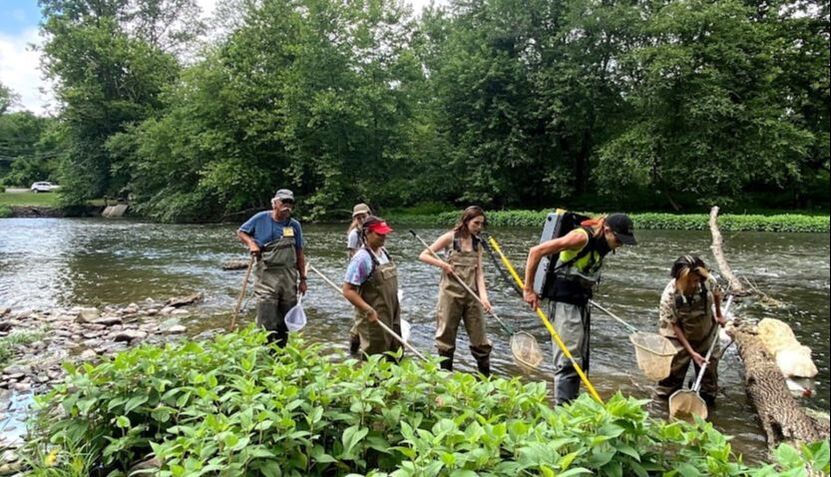Susquehanna University's Stream Ecology Institute: building the next generation of ecologists7/20/2021 "One moment that seems as thought the entire world makes sense but there also are millions of questions just waiting to be answered." This is the moment that Jack Holt, professor of biology and co-organizer of Susquehanna University's Stream Ecology Institute, looks forward to witnessing each year. "After taking measurements in the field and bringing them back to the laboratory the students began understanding their findings in a greater context," said Holt. July 11th-17th, nine high school students participated in the 5th annual Stream Ecology Institute. In 2016, Mike Bilger and Jack Holt founded this educational experience wanting to share their passion for the field with the newest generation of ecologists. The Stream Ecology Institute is a pre-college program that "promotes long-term ecological studies to high school students." "This program is an all-around field station experience that gives students the opportunity to get in the field and laboratory and take as much from the program as they want," said Mike Bilger, adjunct faculty in biology and co-organizer. "Each year a new batch of students comes in with the hopes of learning all they can. Most come in with interests or experience in stream ecology," Bilger said.
This year in particular the group was smaller as a result of the COVID-19 pandemic and vaccination requirements. "In this smaller sized group all the students were able to get personalized attention from himself, Holt, and the Susquehanna student counselors. The growth so far is very apparent," mentioned Bilger. Throughout the 6-day program students perform field and lab work that serves to explore the River Continuum Theory. This is theory looks at the three major sections of the river, the headwaters, middle-waters, and the lower-waters. It is important to study the integration of the three sections and understand how everything that happens upstream affects parts of the ecosystem downstream. Although simple, "this provides students with a great foundation for anywhere their interests may take them in aquatic ecology," said Holt. "The program is modeled to give students a view of what it’s like to be an aquatic ecologist through snapshots of different environments and having them look for commonalities and explanations for them," said Holt. Throughout the program students perform field and lab work which culminates into independent projects that the students present said Zach Cline, counselor. Students come from all over the country to attend the program. "I chose this program because the hands-on nature of the program was unique to any other program that I looked into," said 15-year-old Naloni Grant of Ohio. At the start of the week the students are all complete strangers however by the end, "They become great friends and a good support system for each other going forward," said Catherine Forman, one of the counselors. Throughout the week students got the opportunity to collect samples from the Susquehanna River by kayak, electrofish Penn’s Creek, visit Penn’s Cave, and sample headwater streams in the watershed. 'This wide array of experiences allows the students to develop their interests and have a better idea of what they may be passionate about studying," said Holt. "This program is not just a summer camp. Students are equipped with laboratory instruments and protocols as though they were scientists doing research for the week," mentioned Kendra Dietrich, a counselor and 2016 alumni of the program. As scientists for the week, Erin Leelane, Abby Nigro and Sophia Kucminski all thoroughly enjoyed activities on the Susquehanna including netting fish while kayaking and chemistry of the samples using scientific protocols. "Being able to pick up a macroinvertebrate and ask what is this, then with the help of the adults come to a conclusion on my own", Cadence Gandy said was her favorite part of the experience. This learning environment was made for students both with prior experience and those just getting their feet wet. "It’s not our jobs to force the students to participate but instead help them discover a want to participate," Bilger said. This eagerness to learn is what continues to push Susquehanna staff and students out of their comfort zone and become passionate about their field of study. Holt exemplified this experience saying "I think that field scientists are just kids that never grew up. We like to play in streams and get muddy". A love they hope the newest generation of ecologists will leave the program with. For more information about the program and the work being done at Susquehanna University, visit https://www.susqu.edu/academics/summer-pre-college-programs/stream-ecology-institute/
0 Comments
Leave a Reply. |
AuthorsRiverkeeper John Zaktansky is an award-winning journalist and avid promoter of the outdoors who loves camping, kayaking, fishing and hunting with the family. Archives
July 2024
Topics |

 RSS Feed
RSS Feed